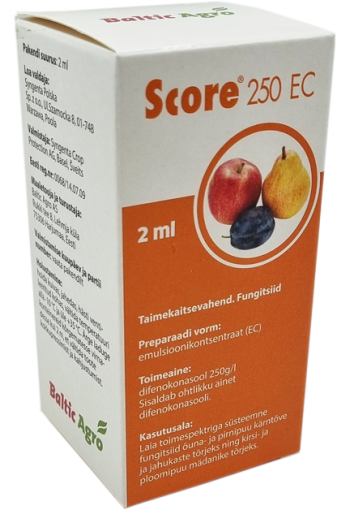"Score" is a systemic fungicide and seed treatment against a wide range of phytopathogens in agriculture. In addition to the protective effect, the drug has a positive effect on the plant itself (increases the area of the leaf blade, the length of the shoot and its leafiness by 1.2-1.6 times), provides the laying of the next year's harvest. Safe for insects, fish, humans, and other warm-blooded and cold-blooded creatures. Does not accumulate in plants and soil.
The effect of the drug does not depend on weather conditions, however, at temperatures of + 12 °C and below, the effectiveness of the drug decreases. When spraying, the drug is absorbed by the leaves, providing a protective and healing effect. The duration of action of the drug used for prophylactic purposes against scab and powdery mildew is 6-7 days, with a therapeutic one - 4-5 days.
It is also used against a wide range of pathogens from the classes of Ascomycetes, Basidiomycetes, Deuteromycetes. Difenoconazole surpasses most drugs in terms of the spectrum of action on phytopathogens, does not have a side retardant effect on seedlings and excludes their thinness. The absorption of the active substance by seeds and shoots occurs gradually, the fungicidal activity of the drug is stable during the most vulnerable phases of plant development at the beginning of the growing season.
Safe for insects, fish, humans, and other warm-blooded and cold-blooded creatures. Does not accumulate in plants and soil.
Active ingredient: difenoconazole.
The effect of the drug does not depend on weather conditions, however, at temperatures of +12°C and below, the effectiveness of the drug decreases.
When sprayed, the drug is absorbed by the leaves, providing a protective and healing effect.
The duration of action of the drug used for prophylactic purposes against scab and powdery mildew is 6-7 days, for therapeutic purposes – 4-5 days.
It is also used against a wide range of pathogens from the classes of ascomycetes, basidiomycetes, and deuteromycetes.
Difenoconazole is superior to most drugs in the range of effects on phytopathogens, does not have a side retardant effect on seedlings and eliminates their thinning. The absorption of the active substance by seeds and sprouts occurs gradually, the fungicidal activity of the drug is stable during the most vulnerable phases of plant development at the beginning of the growing season.
It has specific activity against powdery mildew, apple scab and stone fruit diseases, as well as against smut, root rot and molding of seeds.
Another feature of difenoconazole is its gentle effect on the cultivated plant. In a series of tests, it was found that, compared to other substances, when using this product, seed germination is accelerated by two days, and seedlings appear simultaneously.
There is also an increase in bushiness and an increase in productive stems with the same length of plants, which greatly facilitates harvesting.
Treatment of seeds with the drug can begin long before sowing (treated seeds can be stored from several months to a year).
Although the drug can be used for therapeutic purposes, the best results are obtained from its prophylactic use.
We recommend 2 sprays before flowering and 2 after it, the first in the pink bud phase, subsequent ones at intervals of 10-12 days. The maximum number of treatments is no more than 4. The last spraying should be no later than 20 days before harvest.
Mechanism of action.
Difenoconazole penetrates into plant tissue, completely inhibits the growth of subcuticular mycelium, and reduces the level of sporulation of the pathogen.
When processing seed material, it penetrates deep into the seeds and is able to spread throughout all organs as the plants grow.
Application.
Registered drugs based on difenoconazole are approved for use against diseases of apple, pear (scab, powdery mildew), sugar and fodder beets (cercospora, powdery mildew, Alternaria), potatoes, open ground tomatoes (Alternaria), flower plants (powdery mildew, gray rot ) and etc.;
against spring wheat diseases (head smut, seed mold, fusarium root rot, helminthosporium root rot, loose smut, septoria, pythium root rot), etc.
Toxicological properties and characteristics.
Safe for bees, non-toxic to birds and earthworms. Low toxicity to fish.
Preparations based on difenoconazole for warm-blooded animals are low-toxic (hazard class 3).
Do not irritate the skin and mucous membranes of the eyes.
The substance practically does not move in the soil. A study of the dynamics of the toxicant showed that in the first two years of treatment with the drug “Skor” based on difenoconazole, its residual quantities in the soil were not observed after three days. After three years of a similar garden protection system, residual amounts of the drug (not exceeding the approximate permissible concentrations of ODC) were present for 14 days. Upon further study, the period of complete disintegration increased to 21-24 days after the last fourth treatment.
When harvesting, no residual amounts of the xenobiotic were detected.
Preparation of working solution: 2 ml per 10 liters of water.
Consumption of working solution: 2 liters for young trees or shrubs and up to 5 liters for mature fruit-bearing trees.
The maximum number of treatments is 4.











